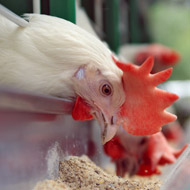MEPs vote to curb antibiotic use in farming

MEPs voted to prohibit the use of preventative antibiotics to single animals, and only when this is deemed 'fully justifiable' by a veterinary surgeon.
The use of antibiotics in farming could be restricted after MEPs voted in favour of draft plans to change an EU law on veterinary medicines.
Specifically, MEPs called for a ban on the preventative use of antibiotics, restrictions on their collective use and a ban on drugs that are critically important for human medicine.
"The fight against antibiotic resistance must start on farms," said French MEP Françoise Grossetête. "We wish to prohibit the purely preventive use of antibiotics, restrict collective treatment to very specific cases, prohibit the veterinary use of antibiotics that are critically important for human medicine and put an end to online sales of antibiotics, vaccines and psychotropic substances.
"Thanks to these measures, we hope to reduce the amounts of antibiotics found on consumers’ plates."
MEPs voted to prohibit the use of preventative antibiotics to single animals, and only when this is deemed 'fully justifiable' by a veterinary surgeon.
"However we need not reduce the therapeutic arsenal available to vets," added Françoise Grossetête. "This law aims to facilitate their work. It is absolutely necessary to encourage research and innovation in this sector."
The revised law would also empower the European Commission to select antimicrobials that must be reserved for the treatment of humans.
MEPs also supported plans to encourage research into new antimicrobials, including longer periods of protection for technical documentation on new medicines, commercial protection of innovative active substances, and protection for significant investments in data generated to improve a drug or keep it on the market.
The proposals will now be considered by the council of ministers.



 The latest
The latest